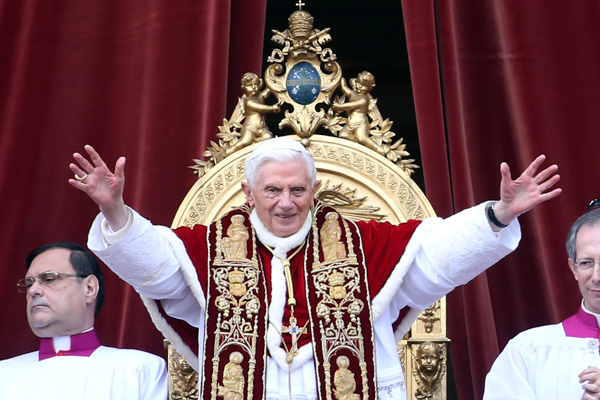In March 2005, when it became clear that Pope John Paul II would soon die, Boris Johnson asked me to write a piece for The Spectator predicting who would be chosen as the next pope. With no special insight into the minds of the cardinals, I ran through the possibilities that had been mentioned in the press — an African such as the Nigerian Cardinal Arinze, a South American such as Cardinal Claudio Hummes, a Frenchman such as Jean-Marie Lustiger, the Archbishop of Paris — but concluded that the best candidate would be the Prefect of the Congregation for the Doctrine of the Faith, Josef Cardinal Ratzinger.
At the time it seemed unlikely that he would be chosen. His role as the guardian of orthodoxy had made him unpopular with liberal Catholics and Anglicans who favoured intercommunion. He was the bête noir of progressive secularists for his strictures on condoms and Liberation Theology; and, aged 77, he was thought too old. However, at the funeral of Pope John Paul II, Cardinal Ratzinger gave an impressive address outlining the challenges faced by the Church. Many of the cardinals were no doubt persuaded that the man capable of such a clear diagnosis should now deal with the disease.
Has Pope Benedict shown himself to be up to the job? Over the long history of the Roman Catholic Church, there have been popes like Gregory the Great who were inspired administrators, and others who were not. Pope Benedict XVI had little experience in governance; he had served for only a short time as Archbishop of Munich and ran a small staff at the Congregation of the Doctrine of the Faith. From the start of his pontificate, he was clearly determined to delegate the more mundane duties of his ministry to others, in particular his prime minister, the Secretary of State. He wished to keep space in his life to study and to teach. In due course he wrote a series of outstanding Encyclicals, among them Deus Caritas Est and Sacramentum Caritatis; and a trilogy, Jesus of Nazareth.
Until the late 20th century, popes rarely left the Vatican. It was Pope Paul VI who initiated pontifical pastoral visits to the four corners of the world. Shy and scholarly, Pope Benedict never looked comfortable in front of crowds; but given that he lacked the charisma of his predecessor, his public appearances were remarkably successful. His gentle manner and kindly smile proved beguiling.
Intellectually, Pope Benedict has been acute and fearless: as Prefect of the CDF he had said that from a Catholic perspective the Anglican Communion was ‘not a church in the proper sense’; and as Pope, in a lecture in Regensburg, he quoted the observation of a Byzantine emperor that certain aspects of Islam were ‘evil and inhuman’.
In his theological writing, Pope Benedict showed an exceptional clarity of thought and expression; and it is this lucidity that has undoubtedly brought him to realise that he should resign. The reasons he has given are that he is now too weak both in body and mind to properly exercise the Petrine ministry. Clearly, the gruelling pastoral visits abroad had become an ordeal for a man of his age, and he may well have been demoralised by the unending revelations of the clerical abuse of children and charges that he covered them up. He may feel that he has failed in the task he set himself of countering moral relativism in the developed world. The British MPs who listened politely to his address in Westminster Hall in 2010 last week voted overwhelmingly in favour of same-sex marriage: among the majority were 47 Catholics.
It has also been shown in a most humiliating way that Pope Benedict has not been in control of the governance of the Holy See. His butler, Paolo Gabriele, charged with passing the Pope’s confidential papers to a journalist, Gianluigi Nuzzi, told prosecutors that, from conversations he overheard as he served at table, it was clear that Pope Benedict was being kept in the dark by his closest advisers about various scandals in the Vatican. Gabriele, a true Italian, assumed this was the result of a conspiracy. It seems more likely that Pope Benedict’s minders, the handsome Monsignor Georg Gänswein and the Papal Secretary, Monsignor Alfred Xuereb, wanted to save him from distraction so that he could get on with his book on the infancy of Jesus. Mundane matters such as EU regulations on money-laundering could be left to the Pope’s Secretary of State, Cardinal Bertone.
Pope Benedict, in his retirement, will able to look back at some considerable achievements during his eight years as pope; and we can look forward to further luminous writing. It was always what he did best.






Comments